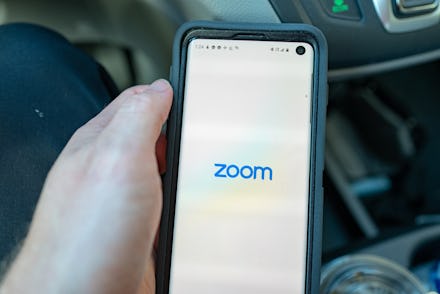The Zoom iOS app is secretly giving Facebook your data

The Zoom iOS app is quietly sending user information to Facebook, Motherboard reports, and it's doing so even if you don't have a Facebook account. The data includes information about when a user starts the app, what kind of device they use, where they're located, their phone carrier, and unique advertiser data that companies use to create targeted ads. Zoom did not disclose this information in the company's privacy policies, meaning some users might not be aware that using a non-Facebook app will still result in their data being sent to Facebook.
Zoom is one of the biggest hits to emerge from these socially distant times, with its convenient video conferencing features that can bridge the distance when groups of people need to communicate. People have been using Zoom to celebrate birthdays, conduct classes, catch up with friends, and trap employees in inescapable work meetings. Even politicians have been seen using Zoom for meetings.
But there are legitimate privacy concerns with using Zoom, such as security and collecting 'customer content' that could be used for advertising purposes. This content can be any video, call, or transcript you produce through the software. And, according to Consumer Reports, the videos you record could be used to help develop facial recognition software.
Sending data to Facebook, even when you don't have a Facebook account, is not an accident. It happens because many developers use Facebook's 'software development kits' to help them implement Facebook features into their apps. Using the kit means sending Facebook information about who's using your product. So, for better or worse, it's not all that unusual for apps to send data to Facebook. What's different about the Zoom situation is the company kept quiet about it, despite Facebook itself recommending data transfers be disclosed to users.
"If you use our pixels or [software development kits], you further represent and warrant that you have provided robust and sufficiently prominent notice to users regarding the Customer Data collection, sharing, and usage," states Facebook's Business Tools terms. The terms go on to say that apps must clearly explain that "third parties, including Facebook, may collect or receive information from [the app] and other apps that use that information to provide measurement services and targeted ads." Apps must also have prominent links that show "how and where users can opt-out of the collection and use of information for ad targeting."
Zoom's iOS app, Motherboard noted, did not have specific links to Facebook's data collecting activity. Instead, the company made vague references to "third-party service providers and advertising partners" and used Google Ads and Google Analytics as examples. Facebook was not specifically named.
The discovery comes as a reminder that the convenience of software can come at the expense of our privacy. Users should remain informed and aware of where their data goes, and acknowledge that their seemingly private conversations aren't that private at all. Especially not on any platform where advertiser revenue can be made.